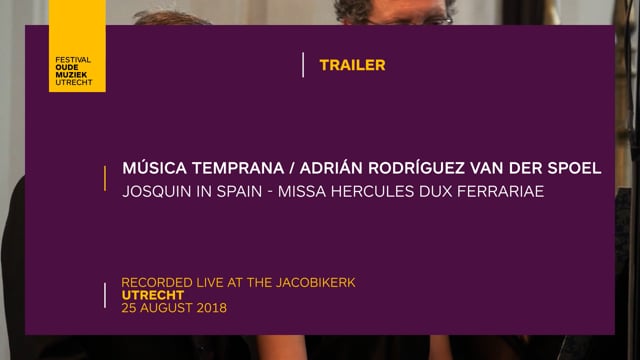Música Temprana
NB: This concert is also available as live stream via EMTV. Click here for the live stream. Don't miss out and enjoy a front-row-seat at home.
In the last decades of the 17th century, when the Spanish ruled in parts of the Americas, first-rate professional music groups emerged. The enormous wealth, resulting from the mining of precious metals and inseparable from the exploitation of people, led to musical splendour in the great cathedrals.
Música Temprana presents grand and spacious music in their concert, with choirs arranged left, right and centre in the Domkerk. These choirs are complemented, in a typically Spanish way, by wind instruments and harps.
For Adrián Rodríguez Van der Spoel, it is a symbolic programme: ‘The three-choir music is music that represents “us and the others”. Améfrica Ladina - the term coming from Brazilian anthropologist Lélia Gonzalez - represents America, Africa and the Latin background. In other words: the indigenous population, the enslaved people and the Europeans. For me, the polychoral music is a recognition of these different groups of people, with empathy for each other.’
Made possible by the Embassy of Spain, The Hague.
Programme
-
Francisco Guerrero
Duo seraphim
1528-1599 -
Juan de Araujo
Dixit Dominus
1646-1712 -
Antonio de Salazar
Arde afable hermosura
1650-1715 -
Anonymous
Ne recorderis
(from: Codex Santa Eulalia 7, Guatemala)17th century -
Anonymous
Miserere mei deus
Bolivia 18th century -
Anonymous
Esta es la cena de amor llenoa / Hoi nace la nueva estiella
De la sagrada Maria
Virgen madre de Dios
(from: Santa Eulalia 7)c1600 -
Antonio de Salazar
Credidi propter quod
-
Juan de Araujo
Oigan, escuchen, atiendan
-
Anonymous
La Salve para la Virgen
Programme subject to changeChiquitos 18th century
Musicians
- Música Temprana
- Lina López, Olalla Alemán, Darta Liepina soprano
- Victoria Cassano, Luciana Cueto, Maximiliano Baños, Laura López alto
- Emilio Aguilar, Jan van Elsacker, Camilo Delgado Díaz tenor
- Pablo Acosta, Javier Jiménez Cuevas bass
- Nuria Sanromà cornetto
- Matthijs van der Molen, Simen van Mechelen sackbut
- François de Rudder, Wouter Verschuren dulcian
- Nick Milne viola da gamba
- Claudia Vélez violone
- Claudio Ribeiro, Jorge López Escribano organ
- Johanna Seitz, Emma Huijsser, Manuel Vilas Rodríguez harp
- Bram Verheijen, Bram Trowborst, João Luis Veloso Pixão, Wessel van der Ham capella gregoriana
- Adrián Rodríguez Van der Spoel musical direction





